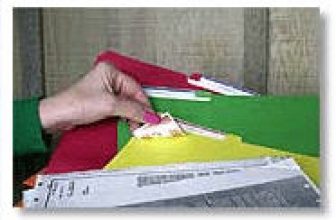
Routeware provides RFID solutions for waste transporters
[ad_1]
Routeware is a hardware and software provider for the waste industry. According to Ed Arib, the company’s senior product vice president, it is integrating a low-frequency RFID interrogator with its DMS 5000 airborne computer. In this way, customers can better see the driver’s loading process, and thus better track valuable assets, such as large garbage bins that need to be transported.EthicsState Instruments is providing RFID readers and passive tags that comply with ISO 11784 and 11785 RFID standards. Garbage collectors attach these tags to bins, trash cans, and other containers.
Arib said the technology can also be used to improve the process by which Routeware customers track the recycling of the residents they serve, while automating the process. He also said that as an incentive for residents to reuse a large portion of their waste, some municipal authorities provide residents with coupons and other discounts. In order to know the weight of each garbage bin and the contents in it, the garbage collection truck is equipped with a scale.
If the houses are far apart, such as in rural areas, the GPS receiver on the collection vehicle can provide very accurate location data, as well as the weight of the trash can to be collected. These data are then transmitted to Routeware’s software middle. Arib said it makes it easier to determine how much things residents can reuse, so that the authorities can reward them accordingly. However, in areas where residents live very close, the GPS system cannot be completely accurate in distinguishing a household from its neighbor’s trash cans. Moreover, high-rise buildings and other physical obstacles affect GPS signals.
In places where the GPS system cannot be used to stimulate recycling, the driver must manually enter the weight and location of the trash can at the location. However, Arib said, if you attach an RFID tag to each trash can and install a mobile interrogator on each collection truck, Routeware can make this task easier.
Arib explained: “We designed the reader’s antenna so that it only reads tags on the trash can that are dumped into the car.” This eliminates the need to use software to filter multi-tag readings, or to avoid reading from multiple tags at the same time. Tag readings extracted from a pile of tags, because the reader antenna on the outside of the car may read it when the car passes by the trash can.
In order to avoid the radio frequency interference caused by the metal frame and the hydraulic arm that lifts the trash can, Routeware uses low-frequency tags and interrogators because its radio frequency signals are not easily affected by metal. The company also noted that even if the label is attached to a large metal container, the label must be readable. “We tested Texas Instruments’ low-frequency label on a large metal container, and it worked fine,” Arib said. “But we still use a barrier on the back of the label to form a buffer between it and the metal container. Area.
Routeware is headquartered in Beaverton, Oregon, and the company has customers all over the United States, including Washington, Texas, and California. These customers include small hauling companies and large municipal waste contractors. Routeware customers who are interested in tracking Dumpsters or other metal containers that are often sent to construction sites and other places can load Texas Instruments readers on the trucks and label each container.
Whether it is tracking these containers, plastic recycling, or trash cans, the Routeware software running on the on-board Routeware DMS 5000 computer installed on the truck will pass through the Texas Instruments interrogation machine from the collection truck on a specific route. Collect label data, and transmit this information to Routeware’s BackOffice through cellular data transmission-a network-based back-end software that collects all collected vehicle data on a specific route. The software also transmits route information and driving to the driver through the DMS computer direction. If the Routeware customer chooses the route it provides, the software will retrieve the data from BackOffice to its internal route tracking or settlement application database.
Routeware and Texas Instruments will showcase this solution at the Waste Trade Fair in Chicago from May 6th to 8th. According to Arib, Routeware initially intends to target customers who are interested in tracking assets such as containers and building debris. However, he said that as part of its residents’ recycling and tracking project, the company is eager to help customers deploy RFID technology.
Rafael Mena, Texas Instruments’ RFID system asset tracking business development and application engineering manager, said that waste management companies in Europe have adopted LF tags and readers as waste tracking applications for more than ten years.
A startup company called RecycleBank used the Texas Instruments label to track and weigh the trash cans of thousands of customers in several eastern European countries. An ultra-high-voltage, high-frequency (UHF) passive RFID system is being used in a suburb of Athens, Greece, to track waste collection.
[ad_2]




